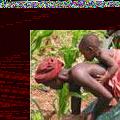President Obama: As for America and the West, our commitment must be measured by more than just the dollars we spend. I've pledged substantial increases in our foreign assistance, which is in Africa's interests and America's interests. But the true sign of success is not whether we are a source of perpetual aid that helps people scrape by – it's whether we are partners in building the capacity for transformational change. (Applause.)
Narrator: When President Barack Obama visited Ghana on July 10th and 11th, trade and economic development between the United States and Africa was a large part of the president's discussions with local leaders. In recent years, the African Growth and Opportunity Act, launched in February 2003, has played an important role in expanding the trade and commercial ties between the U.S. and Africa.
The African Growth and Opportunity Act is a part of U.S. legislation and significantly liberalizes market access to the U.S. for 37 sub-Saharan African countries. The act originally covered the eight-year period from October 2000 to September 2008, but amendments signed into law by U.S. President George Bush in July 2004 further extended the act to 2015. President Obama, in his speech to the Ghanaian parliament, laid out his administration's commitment to AGOA's principles of quality and good governance: President Obama: Wealthy nations must open our doors to goods and services from Africa in a meaningful way. That will be a commitment of my administration. And where there is good governance, we can broaden prosperity through public-private partnerships that invest in better roads and electricity; capacity-building that trains people to grow a business; financial services that reach not just the cities but also the poor and rural areas. This is also in our own interests – for if people are lifted out of poverty and wealth is created in Africa, guess what? New markets will open up for our own goods. So it's good for both. Narrator: The African Growth and Opportunity Act, or AGOA as it's known, builds on existing U.S. trade programs by expanding existing trade benefits under the Generalized System of Preferences, or GSP. Duty-free access to the U.S. market under the combined program now stands at approximately 7,000 product lines. This includes items such as apparel and footwear, wine, motor vehicle components, a variety of agricultural products, chemicals, steel, and others.
Market access for African goods is granted only when countries can demonstrate compliance with rules of origin. These rules describe the percentage value added that must take place locally in a certain country. Ghana's main export categories to the U.S. include forest, agricultural and energy-related products; minerals; metals; and textiles. As could be expected, the amount of trade between the U.S. and Africa has fallen due to the global economic slowdown. Ghana's exports to the U.S. under the African Growth and Opportunity Act fell last year. According to the U.S. Agency for International Development, Ghana's exports of footwear fell as much as 75 percent in 2008. Beyond the global economic recession that affected many African countries' exports in 2008 and reduced demand in the United States, other work remains to be done so countries can realize the full potential offered by the act. The challenges are different for each country: In Ghana, some exporters are unable to meet the quality standards for the US market, due to strict rules of origin and health standards. Some exporters lack the expertise, information, and coordinated efforts to take advantage of the Act's benefits. In these circumstances, the integration of partnership-building efforts with programs such as America's Millennium Challenge Corporation, has achieved tangible and lasting results. Jeri Jensen is Managing Director of the Millennium Challenge Corporation's private sector initiatives: Jeri Jensen: AGOA and MCC are cornerstones really of the administration's policy on economic development in Africa because they both have huge potential in terms of stimulating trade and investment. They're extremely complimentary, I think, from a company's perspective, trying to take advantage of AGOA. Trade preferences are really only, they're part of the equation, they're maybe half of the equation depending on what products you want to, what sectors you want to invest in, what products you want to export, but it's infrastructure that a company needs to lower costs, to increase competitiveness, to get their goods to market, and most MCC countries have chosen to do just that – to invest in infrastructure. Narrator: The success of the African Growth and Opportunity Act also depends on other areas that are important in U.S.-Africa relations such as health care, education, and institution-building. Continued investment in health, especially in the prevention and treatment of HIV/AIDS and other tropical diseases, can have a positive impact in building human resources. Likewise, investment in education through exchange programs, international educational initiatives, and the development of African management capabilities can be more fully developed. Finally, governments can play a large role in facilitating trade. Improved economic infrastructure and long-term human capacity development can help sustain private sector growth.
The integration of approaches to health, education and economic development is a critical part of the success of U.S.-African economic partnership.

